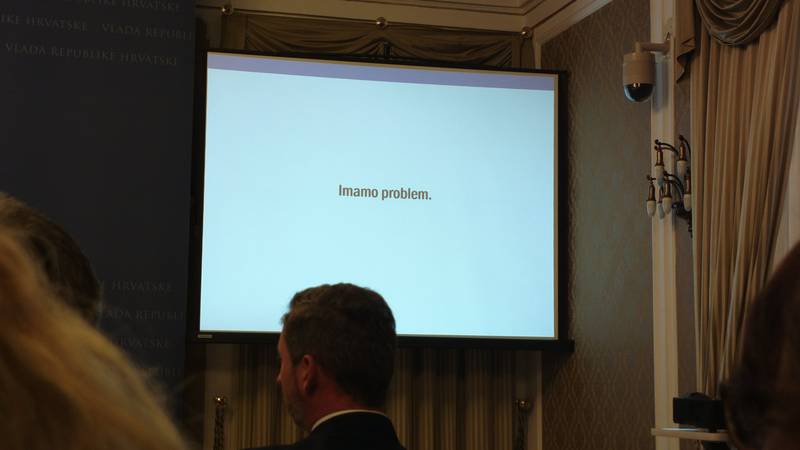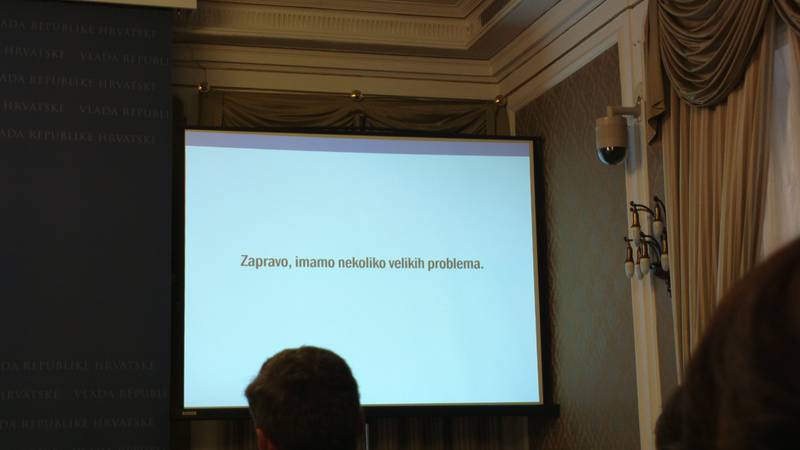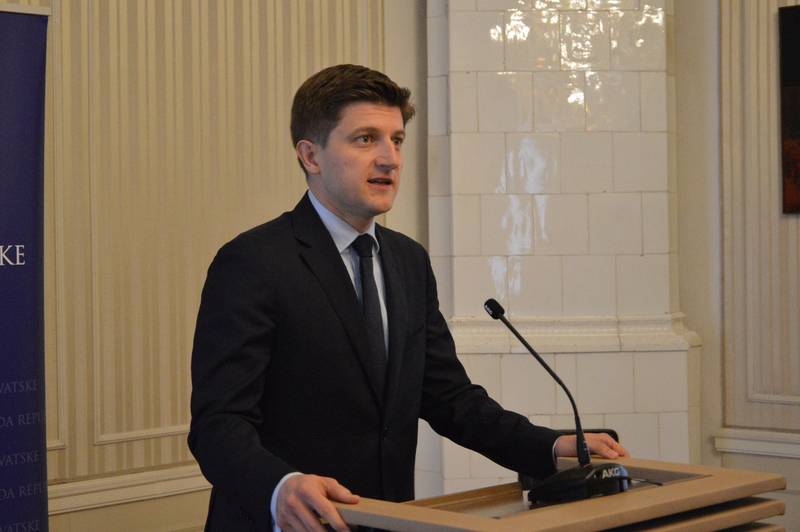Instead of Reform after Reform, Scandal after Scandal in Croatia
Adelina Marini, May 17, 2016
 When on April 28 Croatian Prime Minister Tihomir Orešković began the presentation of the national programme [in Croatian] for reforms with the words “we have a problem”, the country was entering its fourth month of political crisis. Tension in the ruling coalition is growing every day and already instead of the expected reforms, it mainly produces scandals. There is talk of changes in government and the majority in Parliament, there are even preliminary elections expected in autumn. Conflicts are on several levels and the needed reforms remain the same. Ironically, this coalition came to power exactly with the promise of reforms. Instead, the senior partner, the Croatian Democratic Union (HDZ), materialised the forecasts of its political arch-enemy – the Social Democratic Party (SDP), whose slogan during the election campaign was that there was no going back to the old ways and that the HDZ was a party of corruption.
When on April 28 Croatian Prime Minister Tihomir Orešković began the presentation of the national programme [in Croatian] for reforms with the words “we have a problem”, the country was entering its fourth month of political crisis. Tension in the ruling coalition is growing every day and already instead of the expected reforms, it mainly produces scandals. There is talk of changes in government and the majority in Parliament, there are even preliminary elections expected in autumn. Conflicts are on several levels and the needed reforms remain the same. Ironically, this coalition came to power exactly with the promise of reforms. Instead, the senior partner, the Croatian Democratic Union (HDZ), materialised the forecasts of its political arch-enemy – the Social Democratic Party (SDP), whose slogan during the election campaign was that there was no going back to the old ways and that the HDZ was a party of corruption.
Does the HDZ change its skin?
Another scandal that is shaking Croatia these days is connected to the oil company INA. Due to allegations that he was taking bribes from the Hungarian petrol company MOL during the sale of INA shares, former Croatian Prime Minister Ivo Sanader was convicted for corruption. At the time he was also leader of HDZ. It was exactly sending Sanader to prison that opened the doors of the EU wide to Croatia on 1st July 2013 and branded it the white swallow of enlargement – the state to prove that transformation is possible. Presently, however, Sanader walks free after the Constitutional Court overthrew his sentences. It is expected that one of the cases against him will be reopened any moment now. To the Croatian political skyline, however, once more rises INA. This time the scandal is linked to the present HDZ leader, Tomislav Karamarko. His wife, it turns out, had a contract for PR services with one of the MOL lobbyists and Karamarko's friend. At the time of signing the contract Tomislav Karamarko and Ana Šarić were not married, but were in a relationship. Former PM and former leader of HDZ Ivo Sanader was convicted in another court case as well, also involving a PR agency.
At the moment, the decision of the Conflict of Interests Commission is being expected, which hinted last week that there may not be a direct conflict of interests, but there certainly is a moral issue. The new findings scandalised the party itself, which with much effort managed to overcome the branding that was placed on it, including by the court, of a party of corruption. The new scandal surrounding INA is a heavy loss to the HDZ, which regardless of all managed over the last four years to recuperate and win several elections in a row. Regardless of what the Conflict of Interest Commission will decide, it is obvious that Tomislav Karamarko has spent all of the political capital that the party has been accumulating over the last few years on the back of the  former government, which promised reforms but did not have the strength to deliver them, and also due to its nationalist rhetoric.
former government, which promised reforms but did not have the strength to deliver them, and also due to its nationalist rhetoric.
Ever since they entered government, however, the HDZ have not quit dealing with staff issues. Their battle to harness the repressive sector, the scandal surrounding the replacement of the boss of the key intelligence agency SOA with the participation of President Kolinda Grabar-Kitarović (elected out of the HDZ ballot), the scandalous appointments right from the beginning of the term which revealed low moral integrity, media repressions – it was like all proved the threats of former PM and freshly re-elected SDP leader Zoran Milanović, that with the HDZ Croatia is falling backwards. The more and more open conflicts with PM Orešković and the coalition partner MOST are just part of everyday news in Croatia.
The role of the junior coalition partner MOST of independent lists as a corrective, despite of its political inadequacy, as well as the quickly worsening foreign political image of Croatia and the threat of a heavy loss at possible preliminary elections increased the tension within the HDZ, adding to the attacks coming from the pre-election coalition partners in the Patriotic coalition. Last week, was the third in a row, ending in inability to gather a quorum in Parliament in order to vote on the bills waiting in line. The missing members of Parliament are mainly from the ranks of the HDZ. This brought on the resignation of the deputy-chairmen of the parliamentary group of the party Gordan Jandroković (former foreign minister) and Davorin Mlakar. The group leader Ivan Šuker was furious because of the lack of quorum. Already the first resignations from the party started coming in.
Is there a pilot in the airplane?
Against this background, the foreign-national prime minister and his finance minister (HDZ) attempted bringing the debate back to reforms. The reform plan presentation was started by the Canada-grown PM Orešković with the words “We have a problem”. The largest one is the level of public debt, which amounts to 86.7% of GDP. Another key issue, as outlined by the prime minister, is the rate of economic growth – a lot slower than necessary for the country, which spent more than six years in a deep recession, ending in huge unemployment and amounted debt. Demographic trends further worsen the situation. The UN forecasts that by the year 2050 the country’s population will shrink to 3.5 million from the current little over 4.4 million. Actually, one of the pre-election theses of the Patriotic coalition and the HDZ in particular  was that too many young people and specialists are leaving Croatia looking for better realisation.
was that too many young people and specialists are leaving Croatia looking for better realisation.
The demographic issue will exert even more pressure on the pension and social systems. Croatia is at a crossroads, pointed out the PM – Croats must decide whether they are for reforms or against them. If they choose reforms, the following months will be difficult. “Without the implementation of reforms we will be unable to raise our long-term potential”, he warned. In its in-depth analysis of Croatian economy under the procedure on macroeconomic imbalances of March this year the European Commission points out exactly at this problem. In a long-term plan, Croatia is facing the challenge of low potential growth. Because of the depth and duration of recession, Croatia is expected to grow above its potential for the next two years. Later, however, the economy will return to its long-term potential growth of under 1%. The EC believes that such slow rate will affect the process of economic convergence and will slow down dealing with macroeconomic imbalances.
The government is offering 60 reforms, which encompass a wide spectrum. The main measures are aimed at macroeconomic stability and fiscal sustainability. Lowering of public debt is the main priority of the team of Tihomir Orešković and Finance Minister Zdravko Marić. A reform in public procurement, bringing the public sector out in the light, reduction of government structures, Internet-isation and technological upgrade are due. The PM admits that reforms will not be easy, but are important and most of all fair. Backing his words is the spring economic forecast of the EC. It provides for GDP growth of 1.8% over this year and starting to speed up next year. There are several risks to the forecast and the EC evaluates them to be “considerable”.
They are mainly connected to negotiations on collective wage agreements in the public sector, the continued uncertainty about the impact of the loan conversion from Swiss Francs to the local currency (kuna) or euro, as well as uncertainty regarding the ability to implement the reforms programme. According to the in-depth economic analysis of the EC, the reforms programme was frozen last year, expecting the parliamentary elections that were held in the beginning of November. The EC marks “limited progress” in addressing the 2015 country-specific recommendations, which is another name for lack of progress. This means that it is highly probable that this year’s country-specific recommendations will be almost the same as last year’s.
The main problems for Croatia are the high and continually growing public debt, which is a source of vulnerability; debt in the private sector is also very high; other problems are non-performing loans; high unemployment, especially among the young and low qualified; high levels of corporate debt and cumbersome business-environment hindering private investment; weak and fragmented public administration; the education and social systems being plagued with structural weaknesses. Finance Minister Zdravko Marić believes that debt, marked by the government as the main problem, will be contained. He does not agree with the EC forecast that it will continue to grow during this year. His forecast is that it will stabilise and even start dropping. The minister also sees positive risks for the forecast, based on the fact that in the first quarter industrial production grew by 7%, retail by 3.3%, construction has grown by almost 5% in the first two months. There are high expectations this year for an excellent tourist season.
Government’s largest problem, however, remains government itself. Will it survive? If yes, what changes will occur? If not – there will be new elections. They, however, cannot happen earlier than autumn, for at the moment there is an ongoing procedure for the election of Constitutional judges. And even if it comes to preliminary elections, this would mean there will be no reforms this year as well. Polls are already showing a re-birth of the extreme left SYRIZA-oid party Live Wall, which made it to third political power at the presidential elections, but has since collapsed to the parliamentary threshold. Following all the quakes in government sympathies for it have started to return.
There is no other new political power on the horizon yet. The largest opposition party SDP, despite having completed its internal elections and stating it is ready to take over government, is passive and does not offer an attractive alternative. Its talents are still remembered well, although it will be remembered, apart from with the many started reforms that it surrendered, also with its main slogan – establishment of rule of law. Against this background concerns came back that Croatia is threatened by a Greek economic scenario. Adding to the attempts at the realisation of a Polish-Hungarian political scenario, the situation can prove volatile in a region, already suffering from renewed instability.
Is the euro the new goal for Croatia?

At the same time, the reformist duo Orešković-Marić are dreaming of the euro area. Several months ago Prime Minister Orešković surprised the Croatian public by announcing that Croatia wanted to join the common currency zone. Reactions were turbulent and negative. It was accepted that the PM either spoke too soon, or did not understand exactly what was going on. Although he did not raise the issue again, it is evident that work is being done in this direction. Minister Marić repeatedly explained that it is too early for such a step. Croatia is far from the criteria for entering the currency mechanism (ERM II), which prepares the country for the adoption of the common currency. When asked by euinside whether membership in the currency club is a goal for the government, he avoided a direct reply. There is no clear horizon either. According to him, the only hindrance at the moment is debt.
For this year the EC forecasts that the debt-to-GDP ratio is going to grow to 87.6% and will start dropping in 2017. Even considering the most optimistic scenario of the finance ministry, debt will drop to 80% of GDP in 2019 at the most. This means that Croatia could not even consider euro area membership or at least entering the currency mechanism before the year 2022, or even later. All this provided it implements reforms, generates higher economic growth and thus lowering debt down to the acceptable by the Stability and Growth Pact 60% at a faster rate. It is possible that by that time rules become more flexible. There is already talk in the euro area about this. Caution, however, still prevails. It is just as possible that entering the euro area becomes harder and the conditions becoming more, having in mind the lessons learned from the crisis.
The most necessary prerequisite for entering the euro area is political stability. This is exactly what is missing most in the country at the moment.
Translated by Stanimir Stoev
 Kolinda Grabar-Kitarovic | © KGK
Kolinda Grabar-Kitarovic | © KGK Jozo Rados | © European Parliament
Jozo Rados | © European Parliament Aleksandar Vucic, Andrej Plenkovic | © Vlada RH
Aleksandar Vucic, Andrej Plenkovic | © Vlada RH